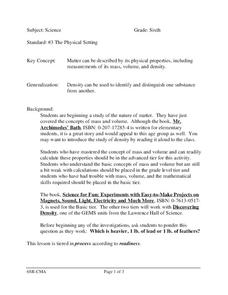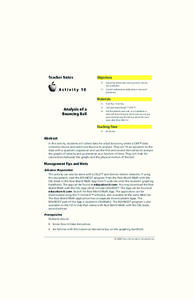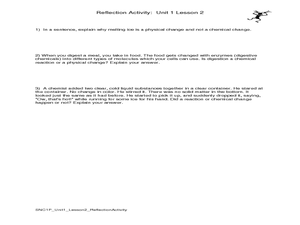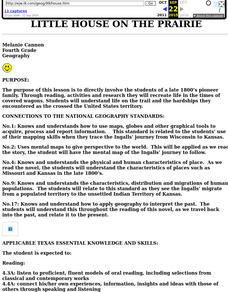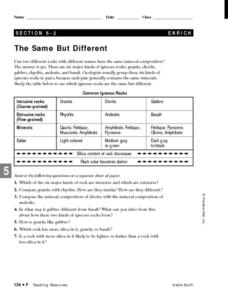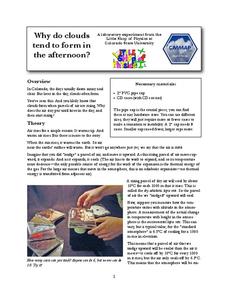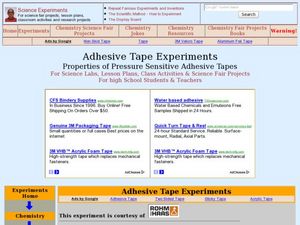Curated OER
Physical properties of matter
Sixth graders find the physical properties of matter. In this matter lesson, 6th graders measure mass, volume, and density. Students are broken into 3 tiers with 3 different activities based on their understanding of mass and volume.
Curated OER
Hoe Down: An Integrated Unit on Social, Folk & Square Dancing
Fifth graders experience the movements required to perform social, folk and square dancing. They describe each dance movement. Students discuss the elements found in folk art, folk music, and fold dance.
Curated OER
Activity Three -- Rutherford's Discovery (Student Page ) A Lab Experiment in Physics
This discovery student page offers students an opportunity to work as a team to discover the shape of an object they cannot see. It is an experiment which parallels particle physicists dilemma in not being able to see very small...
Curated OER
Bouncing Ball Experiment
Students collect data for a bouncing ball and select one bounce to analyze. They explore the relationship between velocity, position and acceleration. They seek out connections between the graphs and the physical motion of the ball.
Curated OER
Balancing Act: Olympics, Winter Sports, Ice Skating, Gravity, Physics, Science
Students, by way of the Olympic Games event of ice skating, are introduced to the concepts of gravity. They try some hands-on gravity experiments and explore the concept of gravity through art.
Curated OER
Hold Off on the Headphones
Students explore hearing loss caused by sound waves. In this physical science lesson plan, students will start by learning about waves and wave characteristics and move into sound waves. Students will study how sound effects their...
Curated OER
Physical Science: Bubble Prints
Students participate in a lab experiment involving soap bubbles and making bubble prints. They blow bubbles into the soap and add paint to make bubble prints. With extra time, they can play with a variety of bubble toys to see what...
Curated OER
Physical and Chemical Changes
Students differentiate physical and chemical changes. In this chemistry lesson, students identify five indicators that a chemical change took place. They complete a reflection journal at the end of the activity.
Curated OER
Pendulum Motion Experiments
Students experiment with simple pendulums to determine the validity of an equation for all angles. Students discover the usefulnes and limitations of approximations in science. Using spreadhseets and a java applet, students observe the...
Curated OER
Little House On The Prarie
Fourth graders focus on the family's journey from Wisconsin to Kansas and their life there among the Indians.
Curated OER
Simple Machines IV - Levers
The lever is an everyday simple machine. Youngsters learn the principles of levers and explore their many uses. Groups of pupils perform a simple lab where they lift objects with a fulcrum while placing the load in a variety of...
Curated OER
Alka-Seltzer Cannons
The scientific method is emphasized in this engaging and exciting chemistry lesson. Learners get to create Alka-Seltzer cannons out of film cannisters, water, and Alka-Seltzer tablets. Carbon dioxide gas builds up inside the cannister,...
Curated OER
The Same, But Different
Third graders examine the phase change between solids and liquids and determine it to be a physical change. Ice is the perfect item to use to demonstrate this phase change. Pupils experiment with measuring and weighing solid ice and the...
Colorado State University
Why Does the Wind Blow?
Without wind, the weather man wouldn't have much to talk about! Blow away your junior meteorologists with a creative demonstration of how wind works. The activity uses an empty soda bottle and compressible Styrofoam peanuts to illustrate...
Transforming Education
SEL for Educators Toolkit
Four resources make up the SEL toolkit for educators. Intended for those that teach kindergarten to twelfth grade, helpful files include a companion guide, presentation, reference list, and a one-page snapshot that neatly showcases the...
Colorado State University
Why Do Clouds Form in the Afternoon?
The stability of the atmosphere changes on a daily basis. A kinesthetic lesson models how the stability of the air changes as it's warmed by the sun. Learners connect their models to the changing air currents and movement of warm and...
Curated OER
Take a Roller Coaster Ride
Students investigate how roller coasters are built. In this physics lesson, students research the laws of physics that affect roller coaster construction. Students create their own roller coaster design.
Curated OER
"Stick to It!" Properties of Pressure Sensitive Adhesive Tapes
Students investigate the strength of different adhesives. In this physical science lesson, students compare the force needed to peel adhesive tapes from a surface. They analyze collected data and make a generalization.
Curated OER
Battery Charger
Students explain how battery chargers work. In this physics lesson, students discuss the two main ways that vehicles get charged. They build their own battery charger.
Curated OER
Gravity Gets You Down
Students design an experiment to investigate how objects with different masses fall. In this physics lesson, students predict how these objects will fall in a vacuum tube. They write a report explaining experimental results and conclusion.
Curated OER
Flight Dreams - Flight Factors
Students investigate the physics of flight by experimenting in class. In this history of flight instructional activity, students define terms such as gravity, lift, and drag in order to better understand how a plane is able to stay in...
Curated OER
Reed Switch
Students build simple electromagnetic reed switch motors. For this physics lesson, students explain how it works. They cite real world applications of reed switches and relays.
Curated OER
Electromagnetic Bomb (E-Bomb)
Students explain how E-bomb works. In this physics lesson, students simulate the effects of e-bombs on electronic targets. They discuss its potential harmful effects when used as a weapon.
Curated OER
Measuring Body Fat
In this body fat measurement worksheet, students will conduct an experiment to determine how the "under-water weighing" technique of measuring body fat works. Once the experiment is complete, students will complete 1 short answer question.


